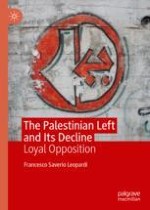2020 | OriginalPaper | Buchkapitel
7. Paths of Decline and Renewal: The PFLP and Leftist Trajectories Across Time
verfasst von : Francesco Saverio Leopardi
Erschienen in: The Palestinian Left and Its Decline
Verlag: Springer Singapore
Aktivieren Sie unsere intelligente Suche, um passende Fachinhalte oder Patente zu finden.
Wählen Sie Textabschnitte aus um mit Künstlicher Intelligenz passenden Patente zu finden. powered by
Markieren Sie Textabschnitte, um KI-gestützt weitere passende Inhalte zu finden. powered by
